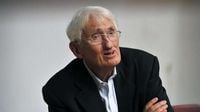In a recent commentary, renowned philosopher Jürgen Habermas, now aged 95, has offered a piercing critique of current geopolitical dynamics, focusing particularly on the implications of the Ukraine war and the role of Europe in an increasingly unstable world. Known for his extensive theoretical contributions and the foundation of discourse ethics, Habermas has often shaped German discourse, especially concerning politics and historical accountability. His views not only resonate with intellectual currents but also invoke serious concerns about the future of Europe.
Habermas argues that the current approach of European leaders towards the Ukraine strategy represents a significant blindness. "These political entities are blinded by the war goals of Ukraine," he states, emphasizing a need for negotiation that has been lacking. He criticizes European politicians for failing to engage enough with Russian President Vladimir Putin, much to the detriment of achieving peace and stability in the region.
Through his lens, Habermas observes that the West, particularly under U.S. leadership, appears to be fragmenting. He suggests that the political stature of the West has deteriorated significantly, exacerbated by the recent inauguration of Donald Trump, a move that he sees as symbolizing the disintegration of cohesive Western policy. This fragmentation, according to Habermas, has led to a failure to unify Europe during a crucial time of crisis.
One of Habermas' central critiques is aimed at Germany for skirting around the long-acknowledged necessity to enhance the European Union's (EU) capacity to act effectively. "An unforgivable political mistake was that Germany has repeatedly evaded the long-recognized challenge of strengthening the EU's ability to act," he observes. He sees Germany's avoidance as a significant lapse, especially amid rising geopolitical tensions that demand a concerted response.
Delving further into the implications of rearmament, Habermas asserts that such action is necessary—not solely due to Russia's threats but because of the broader global uncertainties that cloud Europe’s future. He challenges the notion that rearmament should be understood as merely a reaction to Russia's posture. Instead, he posits that one must consider what Europe, particularly Germany, would become if it developed into a predominant military power in the region. He raises pressing questions about the moral and ethical implications of such a shift: "What would emerge from a Europe where Germany forms a military dominance over its neighbors?"
Habermas expresses disquiet over what he terms the revival of a dangerous military mentality, which he believes could lead the continent back to a mindset that Europe had triumphantly overcome. This concern prompts him to urge a more considered analysis of the risks associated with prolonged warfare, rather than indulging in victory rhetoric often propagated by leaders.
Despite his critical stance, Habermas still perceives potential paths toward resolution, though he likens the current political climate to a scenario devoid of rational negotiation. He notes that Russia, represented by Putin, seems ever more distant from the core principles of discourse that he advocates. Habermas recognizes that he struggles to comprehend the modern sociopolitical landscape, suggesting that perhaps it is not merely the fault of his understanding—but rather that the events themselves are beyond the conceptual frameworks he once found effective.
As Europe grapples with the complexities of its geopolitical role, Habermas' perspectives serve as a reminder of the deep-seated challenges facing the continent. His critiques reflect an urgent call for reflection and reassessment in how leaders engage with the multifaceted threats looming over not just Europe, but the wider international community.
In light of the historical context of his career, Habermas' insights underscore the enduring relevance of dialogue and critical discourse in overcoming conflict, even as the landscape of international relations transforms. His journey through the years has illustrated the importance of grappling with difficult questions about war, peace, and moral responsibility in a world that seems to be entering a new era, one where the old answers might no longer suffice.




